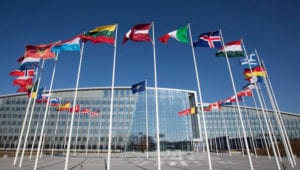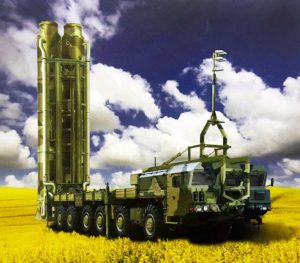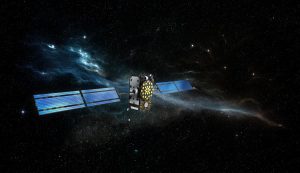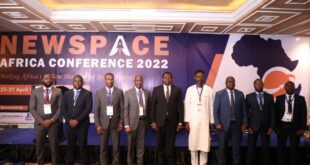
By Frank A. Rose
At the North Atlantic Treaty Organization’s (NATO) December 2019 Leader’s Summit in London, leaders acknowledged that technology is rapidly changing the international security environment, stating: “To stay secure, we must look to the future together. We are addressing the breadth and scale of new technologies to maintain our technological edge.” Leaders also identified outer space as a key area of focus. They declared that “space [is] an operational domain for NATO, recognizing its importance in keeping us safe and tackling security challenges, while upholding international law.” NATO defense ministers had previously approved an initial space policy in June 2019, but the details of that policy have not been publicly released.
Given the increasing role outer space is playing in NATO military operations, and the growing anti-satellite threat from states like Russia and China, NATO’s decision to declare outer space an operational domain was the correct one. The key question now is: How can the alliance develop an effective implementation strategy to ensure it can maintain assured access to outer space and space-derived data?
Such a strategy will require several elements. First, NATO will need to improve its understanding of the anti-satellite threat. Second, outer space will need to be “mainstreamed” within NATO, especially with regard to the defense planning and operations process. Third, NATO will need to improve cooperation and coordination with the United States, the alliance’s leader on outer space issues. Fourth, NATO should identify areas where it might work with the European Union (EU) on outer space. And finally, the alliance will need to find a way incorporate diplomacy into any eventual strategy.
The Emerging Anti-Satellite Threat
The threat to U.S. and allied space systems from anti-satellite weapons continues to grow. As former Director of National Intelligence Dan Coats noted in testimony before Congress in January 2019: “China and Russia are training and equipping their military space forces and fielding new anti-satellite weapons to hold U.S. and allied space systems at risk.” Coats’ testimony is complemented by numerous reports and studies by government and non-governmental organizations like the Defense Intelligence Agency, the National Air and Space Intelligence Center, the Center for Strategic and International Studies, and the Secure World Foundation.

NATO has also been the victim of real-world anti-satellite activities. In March 2019, the Norwegian government accused Russia of “harassing” communications systems during NATO exercises. Recent press reportingnotes that the Norwegian Intelligence Service has documented a number of incidents in which “GPS signals and other secured communications between the Norwegian Armed forces, or NAF, units engaged in exercises were subjected to ‘blocking’ measures from sites located in Russia.” And just last week, U.S. Space Command released a statement claiming that on April 15th, Russia had conducted a direct-ascent anti-satellite missile test. Faced with these real threats, how should NATO respond?
Improve Intelligence-Sharing
Collective action by NATO on outer space security issues will only happen when allies reach a consensus on the anti-satellite threat. As a first step, an appropriate organization at NATO (e.g., the Assistant Secretary General for Intelligence) should be directed to develop a comprehensive assessment of the anti-satellite threat to the alliance.
To be successful, this effort will require the full support of the U.S. intelligence community. Additionally, NATO officials should ensure relevant alliance political and military bodies (e.g., the North Atlantic Council, Military Committee, Senior Political Committee, and Defense Policy and Planning Committee) receive regular updates on the anti-satellite threat.
Mainstream Outer Space at NATO
NATO should ensure that outer space is “mainstreamed” and fully integrated within alliance political and military institutions, and is not treated as merely a “novelty item.” For instance, overall responsibility for outer space should be placed in an organization like the Office of the Assistant Secretary General for Defense Policy and Planning, or the Office of the Assistant Secretary General for Defense Investment, which are responsible for defense policy, planning, and capability investment at NATO. Furthermore, noting the interrelationship between outer space and other domains like nuclear and cyber, NATO will need to establish mechanisms that encourage effective coordination and cooperation across the entire organization, including the military commands.

At the operational level, the alliance should ensure that outer space is incorporated in its major military exercises and wargames. This is critical because if NATO ever comes into a major conflict with Russia, one of Russia’s first targets would be the alliance’s space assets and space-derived information. Therefore, it is important for NATO to conduct its exercises with this in mind. Allied Command Transformation, NATO’s warfare development command, should be tasked to make this a reality.
Ensure Cooperation and Coordination With the United States
At the end of the day, NATO’s ultimate effectiveness in outer space will depend on its cooperation with the alliance’s most important space power: the United States. To date, U.S. leadership has been the key driver of NATO decisionmaking on outer space, and senior U.S. officials have actively engaged the alliance leadership. For example, in October 2019, General John Raymond, commander of U.S. Space Command and chief of space operations, briefed the NATO Military Committee on outer space security issues. These types of senior-level engagements between U.S. political and military leaders should continue and be expanded.
In addition to senior-level engagements, there are a number of other actions NATO and the United States could take to improve cooperation and coordination. Specifically, they should establish clear consultative mechanisms between NATO, U.S. Space Command, and the U.S. Space Force. One relatively easy step that could be taken quickly would be to establish a NATO liaison officer at U.S. Space Command and/or U.S. Space Force headquarters. Indeed, a number of allied officers are currently attached as liaisons at several U.S. combatant commands like U.S. Strategic Command (STRATCOM).
The United States should also seek to incorporate NATO representatives into its outer space-related wargames where possible, especially the Schriever Wargame, the premier U.S. space wargame. According to a U.S. Air Force press release, several allies including Australia, Canada, New Zealand, the United Kingdom, France, Germany, and Japan, have participated in previous Schriever Wargames. The United States should invite NATO political and military officials to participate in the next Schriever Wargame.
Cooperate With the EU

NATO should also explore ways to cooperate with the EU on outer space, primarily because the EU has developed and deployed the Galileo global navigation satellite system, which like the U.S. Global Position System (GPS), provides accurate positioning and timing information. In particular, Galileo includes a capability known as the Public Regulated Service (PRS), an encrypted navigation service for governmental authorized users and sensitive applications that require high continuity. In a crisis situation, PRS could provide NATO important redundancy against an adversary’s attempt to jam or destroy GPS. While many members of NATO are also members of the EU and have access to PRS, non-EU NATO members, and NATO as an organization, currently does not. Therefore, NATO should begin consultations with the EU about the possibility of gaining access to PRS for the alliance.
Don’t Forget Diplomacy
Military solutions alone will not allow the United States and its allies to address the increasing anti-satellite threat. While I have generally supported many of the Trump administration’s space security initiatives like the re-establishment of U.S. Space Command, a key element missing from the Trump administration’s outer space security strategy has been the complete lack of a diplomatic component. Without a more comprehensive strategy that includes a strong diplomatic element, it will make it difficult for NATO to maintain enough political cohesion to pursue effective military policies. These tensions were highlighted in a recent article that noted: “With the exception of France and the United Kingdom, many Europeans countries are deeply uncomfortable with, or down right opposed to, the development and use of weapons in space.”
This is not a problem unique to outer space. Throughout its history, there has been constant tension within NATO over the appropriate balance between defense and diplomacy in its strategy. Since the late 1960s, with the approval of the Harmel Report, named after former Belgian foreign minister Pierre Harmel, NATO has sought to more effectively balance some of the inherent tensions between defense and diplomacy. One of the key findings from the Harmel Report was that “military security and a policy of détente are not contradictory but complementary.” Arms control was considered an essential element of this strategy. The general Harmel Report approach has shaped the key strategic decisions that the alliance has taken over the past 50 years, most notably the “Double-Track” decision in 1979 to deploy intermediate-range nuclear forces in Western Europe, while simultaneously engaging the Soviet Union in arms control negotiations.
As part of its overall strategy for outer space, NATO should develop options and recommendations on how it can advance diplomatic solutions to address the emerging threat to outer space systems. In particular, NATO should task the Arms Control and Disarmament Committee to examine what role the alliance could play in developing norms of behavior to encourage responsible use of outer space. And even though the Trump administration has generally been opposed to arms control, it has expressed openness to the development of norms for outer space. In an recent speech, Assistant Secretary of State Christopher Ford stated: “We clearly need to do more to develop non-legally–binding international norms of responsible behavior that are complementary to the existing legal regime.”
U.S. Leadership Will Be Key
With the increasing role that outer space is playing in military operations, and the rise of the anti-satellite threat, NATO was correct in its decision to declare space as an operational domain in December 2019. The question now is whether the alliance will be able to translate this broad political guidance into an effective strategy.
An effective NATO strategy for outer space will depend on the ability of the alliance to build consensus on the threat; mainstream outer space into NATO’s political and military institutions; find ways to cooperate with the EU; and incorporate diplomacy into that strategy. But at the end of the day, all of this will require clear, sustained, and consistent U.S. leadership.

Frank A. Rose is a senior fellow for security and strategy in the Foreign Policy program at the Brookings Institution. He focuses on nuclear strategy and deterrence, arms control, strategic stability, missile defense, outer space, and emerging security challenges. From 2017-18, he served as principal director and chief of government relations at the Aerospace Corporation, a federally-funded research and development center focused on national security space. Before that, Rose served as assistant secretary of state for arms control, verification, and compliance from 2014-17. Prior to joining the State Department in June 2009, Rose held various national security staff positions in the U.S. House of Representatives, including service as a professional staff member on both the House Armed Services Committee and the House Permanent Select Committee on Intelligence. Rose has also held numerous positions within the Office of the Secretary of Defense, including as special assistant to the assistant secretary of defense for strategy and threat reduction, and policy advisor in the Office of the Assistant Secretary of Defense for International Security Policy. Before that, he worked as a national security analyst with Science Applications International Corporation and on the staff of U.S. Senator John F. Kerry (D-MA). Rose received his bachelor’s degree in history from American University in 1994 and a master’s degree in war studies from Kings’ College, University of London in 1999. Outside of Brookings, Rose is providing outside informal counsel exclusively to the Biden campaign for President.
This essay was originally published on the Brookings Institution’s ‘Order from Chaos’ blog on 22 April 2020 and can be found here, and is republished by SpaceWatch.Global with their kind permission.





